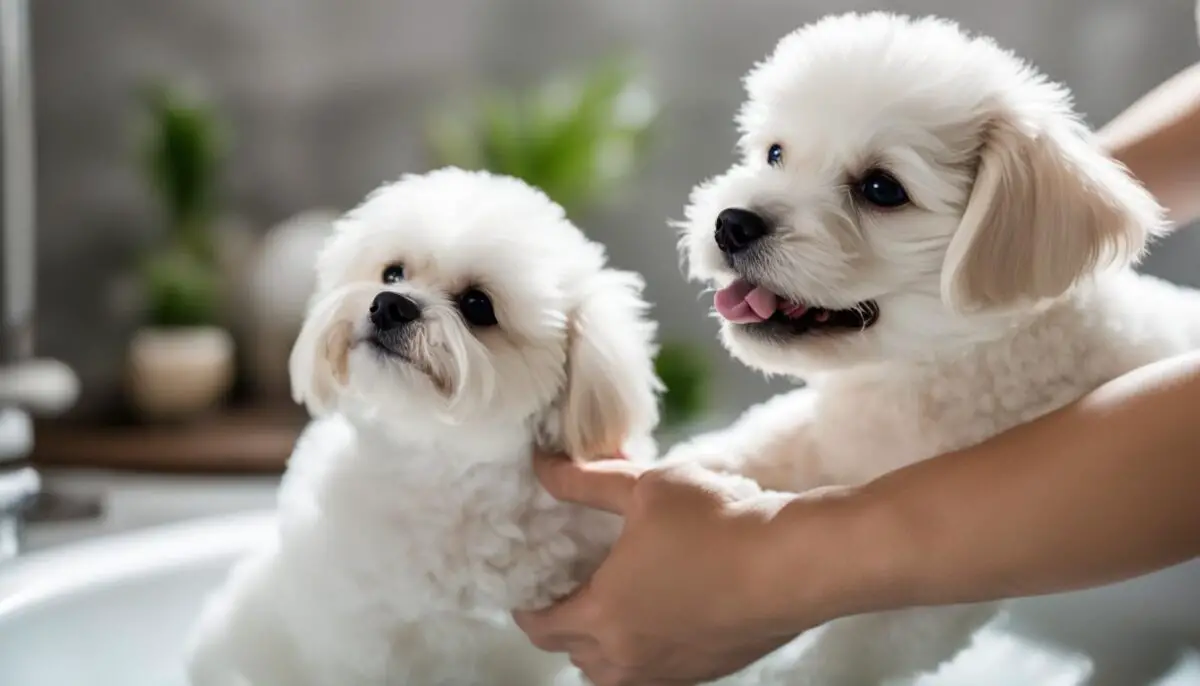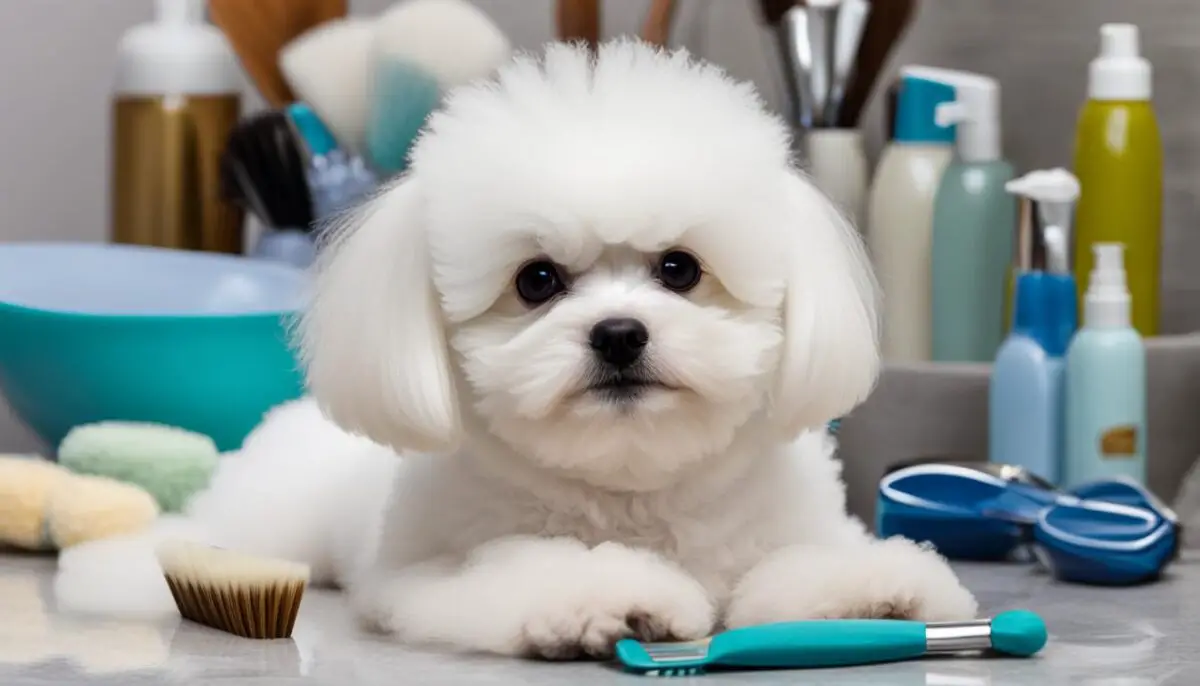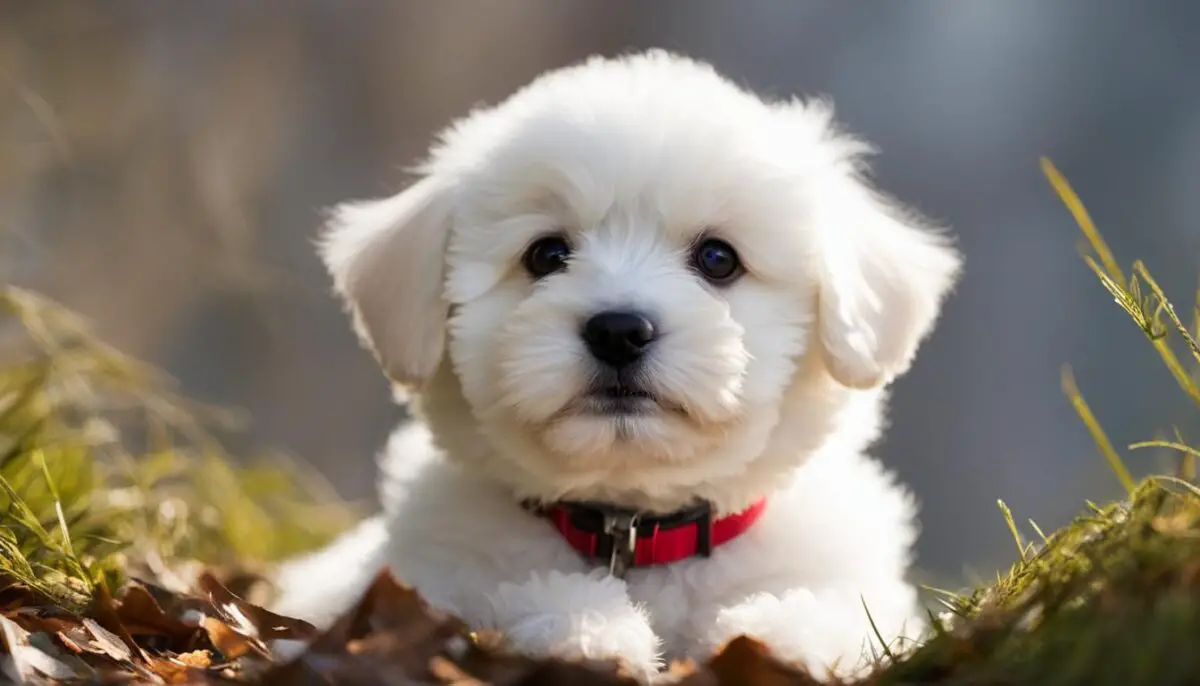Welcome to our comprehensive guide on Bichon Frise puppies! If you’re considering adding a Bichon Frise puppy to your family, you’ve come to the right place. These small, fluffy companions are known for their affectionate nature and playful temperament. Whether you’re looking for information on care, training, or adoption, we’ve got you covered.
Key Takeaways:
- Bichon Frise puppies are small, fluffy companions with a gentle and playful temperament.
- They are known for their affectionate nature and get along well with children and other pets.
- Proper care, including regular grooming and veterinary check-ups, is essential for their health.
- Bichon Frise puppies are relatively easy to train, but positive reinforcement is crucial.
- Consider adoption and provide a loving forever home for a Bichon Frise puppy.
Bichon Frise Puppies
A Brief History of the Bichon Frise Breed
The Bichon Frise breed has a fascinating history that dates back centuries. Originating from a group of ancient dog breeds known as Barbichon, which also includes the Bolognese, Maltese, and Havanese, the Bichon Frise has a rich heritage. These dogs were the companions of Spanish sailors who brought them to the island of Tenerife, where they became known as the Bichon Tenerife. Bichon Frise breeders
In the 14th century, the Bichon Frise gained popularity among the Italian nobility, who valued their charming and delightful nature. However, it was the French who played a significant role in further developing the breed into the lap dog we know and adore today. The French recognized the Bichon Frise’s potential as a companion and refined its appearance and temperament through careful breeding. bichon frise puppy training
In 1971, the Bichon Frise was recognized by the American Kennel Club, marking an important milestone in the breed’s history. Two years later, in 1973, the Bichon Frise became a fully recognized breed. Since then, this lovable and affectionate breed has captured the hearts of countless dog lovers around the world. bichon frise rescue
Table: Bichon Frise Breed History
| Time Period | Major Development |
|---|---|
| Ancient Times | Bichon Frise part of Barbichon group along with Bolognese, Maltese, and Havanese |
| Spanish Sailors Era | Brought to Tenerife, became known as the Bichon Tenerife |
| 14th Century | Popularity among Italian nobility |
| French Influence | Further development of the breed into a lap dog |
| 1971 | Recognition by the American Kennel Club |
| 1973 | Full recognition as a breed |
“The Bichon Frise breed has a storied past, with its roots reaching back to ancient times. From its origins as a Barbichon breed to its refinement by French breeders, the Bichon Frise has a unique history that contributes to its distinctive charm.”
The Affectionate Nature of Bichon Frise Puppies
Bichon Frise puppies are known for their affectionate nature. They have a gentle and playful temperament, making them excellent companions for families, including children and other pets. These puppies love to cuddle and enjoy spending time with their owners. bichon frise puppy adoption
“Bichon Frise puppies are like little bundles of love,” says Dr. Emily Thompson, a veterinarian with over 10 years of experience.
“They thrive on social interaction and are happiest when they can be in close proximity to their families. Their primary focus is on making friends and receiving attention, rather than being overly protective or territorial.”
These affectionate puppies can act as watchdogs by barking to alert their owners, but their main goal is to bring joy and happiness to their families. They are friendly and welcoming to everyone they meet, often winning the hearts of strangers with their sweet nature. bichon frise puppy health
| Characteristic | Description |
|---|---|
| Affectionate | Bichon Frise puppies are highly affectionate and love to cuddle with their owners. |
| Friendly | They have a gentle and playful temperament, getting along well with children and other pets. |
| Social | Bichon Frise puppies thrive on social interaction and enjoy spending time with their families. |
| Loving | They are known for their loving nature and always strive to please their owners. |
When considering a Bichon Frise puppy, it’s important to understand and appreciate their affectionate nature. These puppies will bring love and joy to your home, becoming loyal and cherished members of your family.
Bichon Frise Puppy Health and Care
Bichon Frise puppies, like all dogs, can have certain health concerns that owners should be aware of. By understanding these potential issues and taking preventive measures, you can ensure the overall well-being of your Bichon Frise puppy.
Common Health Concerns
- Bladder Infections: Bichon Frise puppies are prone to bladder infections, which can cause frequent urination and discomfort. To prevent these infections, make sure your puppy has access to clean drinking water and take them for regular bathroom breaks.
- Cataracts: Bichon Frise puppies are also susceptible to developing cataracts, a condition that affects the lens of the eye and can lead to vision impairment. Regular eye check-ups with a veterinarian can help detect and manage cataracts early on.
- Patellar Luxation: Patellar luxation, or kneecap dislocation, is another common health issue in Bichon Frise puppies. This condition can cause lameness and difficulty walking. Regular exercise and maintaining a healthy weight can help prevent patellar luxation in your puppy.
Preventive measures such as regular veterinary check-ups, including specific screenings for these health concerns, can help detect and address any potential issues early on. It is important to choose a reputable breeder who screens their dogs for these health conditions to ensure you are getting a healthy Bichon Frise puppy. bichon frise puppy grooming
Bichon Frise Puppy Care
Proper care is essential for the overall health and well-being of Bichon Frise puppies. Here are some important aspects of Bichon Frise puppy care:
- Diet: Provide a balanced and nutritious diet that is appropriate for your puppy’s age and size. Consult with your veterinarian to determine the best diet plan for your Bichon Frise puppy.
- Exercise: Bichon Frise puppies have moderate activity levels and require regular exercise to stay healthy. Daily walks, play sessions, and engaging in dog sports can help meet their exercise needs.
- Grooming: Bichon Frise puppies have a fluffy coat that requires regular grooming. Brush their coat daily to prevent tangles and matting, and schedule regular bathing and clipping to keep their coat clean and well-maintained.
- Dental Care: Dental hygiene is important for Bichon Frise puppies. Establish a regular teeth-cleaning routine and provide dental chews or toys to promote oral health.
By prioritizing proper care and addressing potential health concerns in a timely manner, you can ensure that your Bichon Frise puppy leads a happy and healthy life.
| Health Concern | Preventive Measures |
|---|---|
| Bladder Infections | Provide clean drinking water and regular bathroom breaks |
| Cataracts | Regular eye check-ups with a veterinarian |
| Patellar Luxation | Maintain a healthy weight and regular exercise |

Training Bichon Frise Puppies
Bichon Frise puppies are highly trainable and eager to please, making them a joy to work with. Positive reinforcement is the key to effective and successful training for these adorable pups. By using rewards, praise, and treats, you can encourage good behavior and create a strong bond with your Bichon Frise puppy. bichon frise puppy socialization.
Early socialization is crucial for Bichon Frise puppies to develop into well-rounded and confident dogs. Expose them to various environments, people, and animals to ensure they become comfortable and friendly in different situations. Puppy training classes can be an excellent option to aid in their socialization process and provide guidance from professional trainers.
To make the most of your Bichon Frise puppy’s training, keep the sessions short and fun. Their sensitive nature requires a gentle and patient approach. Focus on one command or behavior at a time, using clear and consistent cues. Remember to keep a positive and calm demeanor throughout the training process.
Training Tips for Bichon Frise Puppies:
- Use positive reinforcement techniques such as treats and praise to reward desired behaviors.
- Be patient and consistent in your training approach.
- Keep training sessions short and engaging to maintain your puppy’s focus.
- Socialize your Bichon Frise puppy early to help them become comfortable and friendly with people and other animals.
- Consider enrolling in puppy training classes to enhance your puppy’s socialization and receive professional guidance.
Remember, training is an ongoing process that requires patience, consistency, and love. With the right approach and dedication, you can help your Bichon Frise puppy become a well-behaved and happy companion.
| Training Tips for Bichon Frise Puppies |
|---|
| Use positive reinforcement techniques such as treats and praise to reward desired behaviors. |
| Be patient and consistent in your training approach. |
| Keep training sessions short and engaging to maintain your puppy’s focus. |
| Socialize your Bichon Frise puppy early to help them become comfortable and friendly with people and other animals. |
| Consider enrolling in puppy training classes to enhance your puppy’s socialization and receive professional guidance. |
Grooming Tips for Bichon Frise Puppies
Bichon Frise puppies have a signature fluffy coat that requires regular grooming to keep it looking its best. Daily brushing is recommended to prevent tangles and matting. This not only keeps their coat healthy and tangle-free but also helps to distribute natural oils, keeping their skin moisturized. Regular bathing is also necessary to maintain their cleanliness and overall hygiene.

In addition to brushing and bathing, Bichon Frise puppies require regular hair clipping to maintain their adorable appearance. Their coat grows continuously, so trimming is essential to prevent it from becoming too long and unmanageable. Many owners choose to take their Bichon Frise puppies to a professional groomer for haircuts and styling, but it is also possible to learn how to do it at home with proper guidance and tools. bichon frise puppies for sale
To complete the grooming routine, owners should pay attention to other essential aspects such as nail trimming, ear cleaning, and dental care. Regular nail trims help prevent overgrowth, which can lead to discomfort and difficulty in walking. Ear cleaning is crucial to prevent ear infections and excess wax buildup. Lastly, dental care, including brushing your puppy’s teeth regularly and providing dental chews or treats, helps maintain good oral hygiene.
Grooming Frequency for Bichon Frise Puppies
The frequency of grooming for Bichon Frise puppies depends on their individual coat type and personal needs. However, a general guideline is to brush their coat daily or at least a few times a week to prevent mats and tangles. Bathing is recommended once a month, or more often if necessary, using a gentle dog shampoo that won’t irritate their skin. Hair clipping is typically done every 4-8 weeks to maintain a manageable length.
| Grooming Task | Frequency |
|---|---|
| Brushing | Daily or a few times a week |
| Bathing | Once a month |
| Hair clipping | Every 4-8 weeks |
| Nail trimming | Every 4-6 weeks |
| Ear cleaning | Weekly |
| Dental care | Daily |
By following these grooming tips and establishing a consistent routine, Bichon Frise puppies can maintain a healthy and beautiful coat while also staying clean and comfortable. Regular grooming sessions also provide an opportunity for bonding and can be a positive and enjoyable experience for both the puppy and their owner.
Exercise and Activity for Bichon Frise Puppies
Bichon Frise puppies have a moderate activity level and benefit from regular exercise to keep them healthy and happy. Daily walks are a great way to fulfill their exercise needs and provide mental stimulation. Taking them to a local dog park where they can interact with other dogs can also be beneficial for their socialization.
In addition to physical exercise, Bichon Frise puppies thrive on mental stimulation. Puzzle toys and interactive games can help keep their minds engaged and prevent boredom. Engaging in dog sports such as agility, rally, or obedience training can provide both mental and physical exercise while strengthening the bond between you and your puppy.
| Exercise Needs | Activity Level | Mental Stimulation |
|---|---|---|
| Moderate | Daily walks, play sessions | Puzzle toys, interactive games, dog sports |
Table: Exercise and Activity Overview for Bichon Frise Puppies
It is important to note that Bichon Frise puppies do not do well when left alone for extended periods. They thrive on human companionship and can develop separation anxiety if not given enough attention and mental stimulation. Including them in your daily activities and providing them with interactive toys and games can help alleviate any potential anxiety and keep them mentally and emotionally balanced.
Remember to tailor the exercise routine to your Bichon Frise puppy’s age and individual needs. Consult with your veterinarian or a professional dog trainer to ensure that you are providing the appropriate amount of exercise and mental stimulation for your puppy’s overall well-being.
Bichon Frise Puppy Size and Lifespan
Bichon Frise puppies grow into small-sized dogs, typically standing 9-12 inches at the shoulder. They are known for their compact and sturdy build, which makes them perfectly suited for various living situations, including apartments. Despite their small size, Bichon Frise puppies have a cheerful and playful personality, bringing joy to their families.
When it comes to their lifespan, Bichon Frise puppies have an average life expectancy of 14-15 years. This means that they can be a long-term companion, providing love and companionship for many years to come. With proper care, including regular veterinary check-ups, a balanced diet, and an active lifestyle, Bichon Frise puppies can live a healthy and fulfilling life.
| Size | Lifespan |
|---|---|
| Small | 14-15 years |
It’s important to note that these are just averages, and individual Bichon Frise puppies may have slightly different sizes and lifespans. Genetics, diet, exercise, and overall healthcare play a significant role in determining the longevity and well-being of any dog.
So, if you’re considering adding a Bichon Frise puppy to your family, you can expect a small-sized dog with a lifespan of approximately 14-15 years. With their long lifespan, these adorable companions have plenty of time to bring joy and happiness to their forever homes.

Conclusion
In conclusion, Bichon Frise puppies are the perfect addition to any family looking for a loving and playful companion. These adorable little dogs have a gentle and affectionate nature that makes them great with children and other pets. With proper care, training, and socialization, Bichon Frise puppies can thrive and bring joy to their forever homes.
Top 5 Bichon Frise Rescues in the United States
Here is a table of the top 5 Bichon Frise rescues in the United States, including their name, address, phone number, and website link:
| Name | Address | Phone | Website |
|---|---|---|---|
| Bichon Frise Club of America Charitable Trust | National | Not provided | https://www.bichonrescue.org |
| Bichon Rescue Brigade | California | Not provided | https://bichonrescuebrigade.org |
| Bichon Frise Rescue of Northern New Jersey | New Jersey | (973) 208-0191 | Not provided |
| Bichon Frise Club of Northern California | California | (925) 322-0223 | https://www.bichonrescue.org |
| Bichon and Little Buddies Rescue | Wisconsin | (262) 347-8823 | https://bichonrescues.com |
Sources[1][2][3].
When bringing home a Bichon Frise puppy, it is essential to choose a reputable breeder who prioritizes the health and well-being of their dogs. Regular veterinary check-ups and proper grooming are crucial for maintaining the overall health of your puppy. Positive reinforcement training methods will help nurture their sensitive nature and create a strong bond between you and your furry friend.
Remember, owning a Bichon Frise puppy is a commitment that requires time, attention, and love. These fluffy companions thrive on social interaction and mental stimulation, so be sure to provide daily exercise and engaging activities. Whether you choose to adopt or purchase a Bichon Frise puppy, you are giving them a forever home filled with love and care.
FAQ
What is the temperament of Bichon Frise puppies?
Bichon Frise puppies have a gentle and playful temperament. They are known for being affectionate and getting along well with children and other pets.
What health issues should I be aware of with Bichon Frise puppies?
Bichon Frise puppies can be prone to bladder infections, cataracts, and patellar luxation. It is important to choose a reputable breeder who screens for these issues and provide regular veterinary check-ups.
Are Bichon Frise puppies easy to train?
Yes, Bichon Frise puppies are generally easy to train. However, positive reinforcement methods should be used due to their sensitive nature. Early socialization and puppy training classes can also be beneficial.
How often should I groom my Bichon Frise puppy?
Bichon Frise puppies have a fluffy coat that requires regular grooming. Daily brushing, monthly bathing, and clipping are recommended to keep their coat tangle-free and looking its best.
What exercise do Bichon Frise puppies need?
Bichon Frise puppies have a moderate activity level and benefit from daily walks and regular play sessions. Engaging in dog sports like agility can provide mental stimulation and exercise.
How big do Bichon Frise puppies grow?
Fully-grown Bichon Frise dogs stand 9-12 inches at the shoulder and weigh 12-18 pounds. They are considered a small breed.
Top 5 Bichon Frise Rescues in the United States
